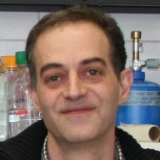
Center for Physiology and Pharmacology (Institute of Pharmacology)
Position: Professor
ORCID: 0000000179925361
T +43 1 40160 31341
emilio.casanova@meduniwien.ac.at
Keywords
Animals, Genetically Modified; Carcinoma, Non-Small-Cell Lung; Inflammation; Kirsten murine sarcoma virus; Receptor, Epidermal Growth Factor
Research group(s)
- Emilio Casanova
Members:
Research interests
My main research goal is modeling human diseases using genetically modified animals as tools. I have a strong expertise in the generation and characterization of transgenic mice (conditional knock-outs, knock-ins, BAC-based transgenic, etc.) mimicking human diseases with special emphasis in lung cancer. Currently, my research group is focused in three main topics:
1) Role of inflammation in KRAS driven lung adenocarcinomas.
2) Targeted and immune-therapies in lung adenocarcinomas .
3) Exploring the possibilities of using BAC-based expression vectors applied to mammalian (e.g. CHO-K1 cells) recombinant protein production, which could provide anti-cancer treatments, a collaborative project with POLYMUN Scientific Immunobiologische Forschung, an Austrian company in the field of recombinant protein production.
Techniques, methods & infrastructure
- Molecular biology
- Cell culture
- Genetically modified mice
- Tumor transplant models
- Recombinant protein production
Grants
- Afatinib in KRAS driven lung cancer (2020)
Source of Funding: FWF (Austrian Science Fund), stand-alone project
Principal Investigator - JAK in KRAS driven lung cancer (2020)
Source of Funding: FWF (Austrian Science Fund), Stand-Alone Project
Principal Investigator - Carbohydrate libraries for improved innate immunity binding (2016)
Source of Funding: FFG (Austrian Research Promotion Agency), BRIDGE
Principal Investigator - EAVI2020 - European AIDS Vaccine Initiative 2020 (project partner) (2015)
Source of Funding: EU, H2020-PHC-2015-single-stage_RTD
Principal Investigator - Growth hormone resistance and liver fibrosis (2013)
Source of Funding: FWF (Austrian Science Fund), Stand-Alone Projects
Principal Investigator - BAC-based Expression System Technology (2011)
Source of Funding: FFG (Austrian Research Promotion Agency), Bridge
Principal Investigator
Selected publications
- Breitenecker, K. et al., 2021. Down-regulation of A20 promotes immune escape of lung adenocarcinomas. Science Translational Medicine, 13(601), p.eabc3911. Available at: http://dx.doi.org/10.1126/scitranslmed.abc3911.
- Mohrherr, J. et al., 2019. JAK–STAT inhibition impairs K‐RAS‐driven lung adenocarcinoma progression. International Journal of Cancer, 145(12), pp.3376–3388. Available at: http://dx.doi.org/10.1002/ijc.32624.
- Moll, H.P. et al., 2018. Afatinib restrains K-RAS–driven lung tumorigenesis. Science Translational Medicine, 10(446), p.eaao2301. Available at: http://dx.doi.org/10.1126/scitranslmed.aao2301.
- Grabner, B. et al., 2015. Disruption of STAT3 signalling promotes KRAS-induced lung tumorigenesis. Nature Communications, 6(1). Available at: http://dx.doi.org/10.1038/ncomms7285.
- Musteanu, M. et al., 2012. A mouse model to identify cooperating signaling pathways in cancer. Nature Methods, 9(9), pp.897-900. Available at: http://dx.doi.org/10.1038/nmeth.2130.